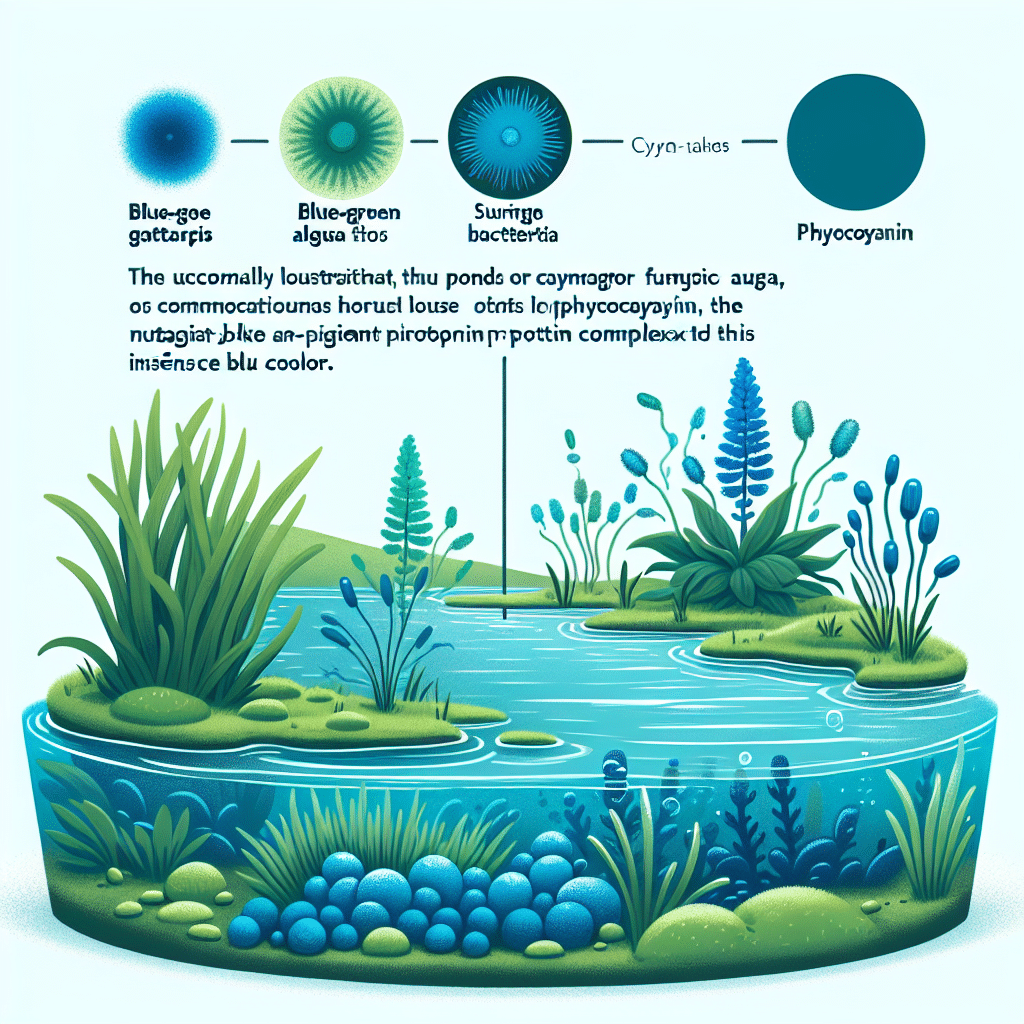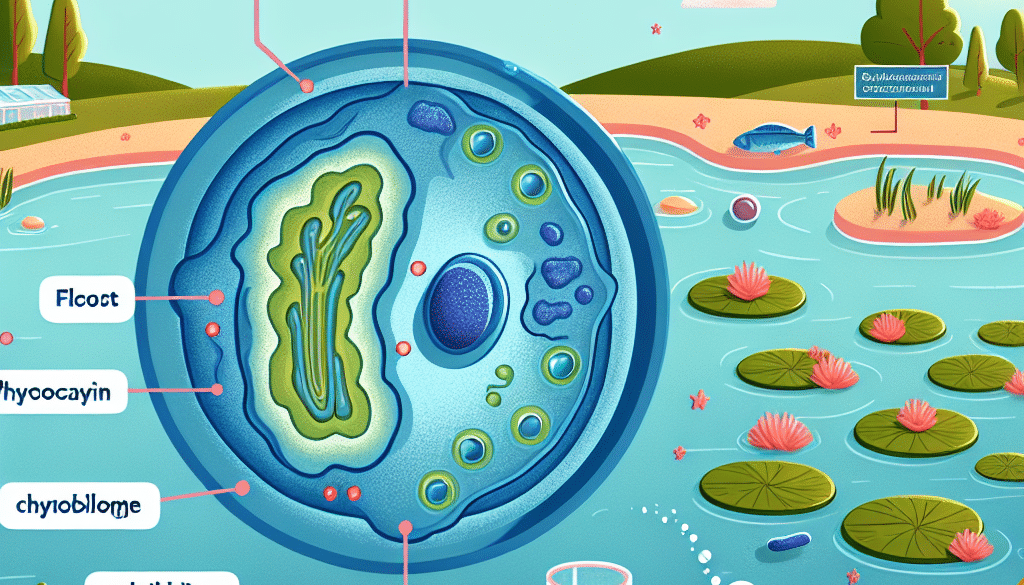Where Is Phycocyanin Found?
-
Table of Contents
- Phycocyanin: The Blue Wonder Found in Nature
- Understanding Phycocyanin
- Natural Sources of Phycocyanin
- Extraction and Purification of Phycocyanin
- Health Benefits and Applications
- Case Studies and Research
- Market Trends and Statistics
- Conclusion: The Blue Gem of the Natural World
- Discover ETprotein’s High-Quality Protein Products
Phycocyanin: The Blue Wonder Found in Nature

Phycocyanin is a pigment-protein complex that is renowned for its vibrant blue color and impressive health benefits. This natural compound has garnered significant attention in the fields of nutrition, cosmetics, and biotechnology. In this article, we will explore the sources of phycocyanin, its applications, and the science behind its health-promoting properties.
Understanding Phycocyanin
Phycocyanin is a type of phycobiliprotein, which is a family of water-soluble proteins found in cyanobacteria (also known as blue-green algae) and certain eukaryotic algae. It plays a crucial role in the photosynthesis process, capturing light energy and transferring it to chlorophyll. Beyond its biological function, phycocyanin is sought after for its antioxidant, anti-inflammatory, and neuroprotective effects.
Natural Sources of Phycocyanin
Phycocyanin is predominantly found in cyanobacteria and some types of algae. Here are the primary natural sources:
- Spirulina: This blue-green algae is one of the richest sources of phycocyanin. Spirulina is commercially cultivated in controlled environments to ensure high purity and quality of the extracted phycocyanin.
- Aphanizomenon flos-aquae (AFA): Another type of blue-green algae that contains phycocyanin, AFA is harvested from wild sources, such as Upper Klamath Lake in Oregon, USA.
- Other Cyanobacteria: Various other species of cyanobacteria also produce phycocyanin, but they are less commonly used for commercial extraction.
While spirulina is the most common commercial source of phycocyanin, it is important to note that not all blue-green algae are safe for consumption. Some may produce toxins, which is why sourcing phycocyanin from reputable suppliers is crucial.
Extraction and Purification of Phycocyanin
The process of extracting phycocyanin from algae involves several steps to ensure the purity and quality of the final product. Typically, the algae are harvested, dried, and then subjected to a process that breaks open the cell walls to release the phycocyanin. The extract is then purified through filtration and chromatography techniques.
Health Benefits and Applications
Phycocyanin is not only prized for its color but also for its potential health benefits. Here are some of the key areas where phycocyanin has shown promise:
- Antioxidant Properties: Phycocyanin has been shown to scavenge free radicals, protecting cells from oxidative stress.
- Anti-inflammatory Effects: Research suggests that phycocyanin may reduce inflammation, making it beneficial for conditions such as arthritis.
- Immune System Support: Phycocyanin may enhance the immune system by stimulating the production of white blood cells.
- Neuroprotection: There is evidence to suggest that phycocyanin may protect neurons and could be useful in neurodegenerative diseases.
In addition to its health benefits, phycocyanin is used as a natural food colorant in products such as candies, ice creams, and beverages. Its vibrant blue hue is also popular in cosmetics, particularly in products that promote natural and organic ingredients.
Case Studies and Research
Several studies have highlighted the potential of phycocyanin in various applications. For instance, research has demonstrated its protective effects against certain types of liver damage. In another study, phycocyanin supplementation was found to improve the symptoms of allergic rhinitis.
Moreover, the cosmetic industry has explored the use of phycocyanin as a natural dye in products, with studies showing its stability and safety for topical use.
Market Trends and Statistics
The global demand for phycocyanin has been on the rise, driven by the growing interest in natural products and the increasing awareness of its health benefits. The market for natural food colorants, in particular, has seen significant growth, with phycocyanin being one of the key products.
Statistics indicate that the phycocyanin market is expected to continue its upward trajectory, with a compound annual growth rate (CAGR) that reflects the increasing consumer preference for natural ingredients over synthetic alternatives.
Conclusion: The Blue Gem of the Natural World
Phycocyanin is a remarkable substance found in nature that offers a plethora of benefits. From its role in photosynthesis to its health-promoting properties and use as a natural colorant, phycocyanin is a testament to the wonders of the natural world. As research continues to uncover its potential, we can expect to see even more innovative applications for this vibrant blue pigment.
Discover ETprotein’s High-Quality Protein Products
If you’re interested in incorporating natural, high-quality ingredients into your diet or products, ETprotein offers a range of protein products that cater to various industries. Their offerings include organic and clear proteins derived from rice, pea, watermelon seed, pumpkin seed, sunflower seed, mung bean, and peanut. Additionally, ETprotein provides L-(+)-Ergothioneine (EGT) in various grades suitable for pharmaceutical, food, cosmetic, and other applications.
With a commitment to non-GMO, allergen-free products with high purity levels, ETprotein is a trusted supplier for nutraceutical, pharmaceutical, cosmeceutical, veterinary, and food and beverage industries worldwide. For more information or to sample their products, reach out to ETprotein today.
About ETprotein:
ETprotein, a reputable protein and L-(+)-Ergothioneine (EGT) Chinese factory manufacturer and supplier, is renowned for producing, stocking, exporting, and delivering the highest quality organic bulk vegan proteins and L-(+)-Ergothioneine. They include Organic rice protein, clear rice protein, pea protein, clear pea protein, watermelon seed protein, pumpkin seed protein, sunflower seed protein, mung bean protein, peanut protein, and L-(+)-Ergothioneine EGT Pharmaceutical grade, L-(+)-Ergothioneine EGT food grade, L-(+)-Ergothioneine EGT cosmetic grade, L-(+)-Ergothioneine EGT reference grade and L-(+)-Ergothioneine EGT standard. Their offerings, characterized by a neutral taste, non-GMO, allergen-free attributes, with L-(+)-Ergothioneine purity over 98%, 99%, cater to a diverse range of industries. They serve nutraceutical, pharmaceutical, cosmeceutical, veterinary, as well as food and beverage finished product distributors, traders, and manufacturers across Europe, USA, Canada, Australia, Thailand, Japan, Korea, Brazil, and Chile, among others.
ETprotein specialization includes exporting and delivering tailor-made protein powder and finished nutritional supplements. Their extensive product range covers sectors like Food and Beverage, Sports Nutrition, Weight Management, Dietary Supplements, Health and Wellness Products, and Infant Formula, ensuring comprehensive solutions to meet all your protein needs.
As a trusted company by leading global food and beverage brands and Fortune 500 companies, ETprotein reinforces China’s reputation in the global arena. For more information or to sample their products, please contact them and email sales(at)ETprotein.com today.












